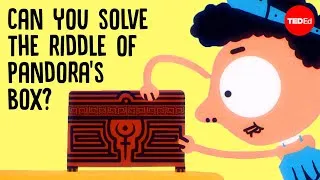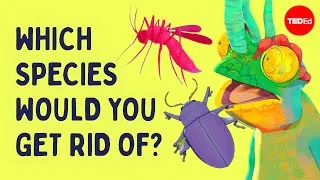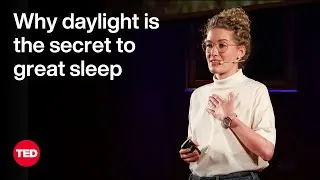請雙擊下方英文字幕播放視頻。
譯者: Regina Chu
審譯者: Marssi Draw
00:12
Hi. I'm going to talk
to you today about laughter,
0
12714
3204
大家好,我們今天來談笑聲,
00:15
and I just want to start
by thinking about the first time
1
15918
2789
我想從回想我自己第一次
00:18
I can ever remember noticing laughter.
2
18707
2029
注意到笑聲開始說起。
00:20
This is when I was a little girl.
I would've been about six.
3
20736
2822
那時我還是一個小女孩,
大概六歲左右。
00:23
And I came across my parents
doing something unusual,
4
23558
3555
我正好看見我的父母
在做一件不太尋常的事,
00:27
where they were laughing.
5
27113
1506
他們當時正在笑。
00:28
They were laughing very, very hard.
6
28619
2067
他們笑得非常非常開心。
00:30
They were lying on the floor laughing.
7
30686
1904
他們笑倒在地板上。
00:32
They were screaming with laughter.
8
32590
1950
他們尖聲大笑。
00:34
I did not know what they were
laughing at, but I wanted in.
9
34540
4227
我不知道他們在笑什麼,
但我想和他們一起笑。
00:38
I wanted to be part of that,
10
38767
1704
我想成為這個笑聲的一部分,
00:40
and I kind of sat around at the edge
going, "Hoo hoo!" (Laughter)
11
40471
3099
我就坐在他們旁邊,
叫著 「呵呵!」(笑聲)
00:43
Now, incidentally,
what they were laughing at
12
43570
3439
順帶一提,
他們當時在笑的
00:47
was a song which people used to sing,
13
47009
2600
是當時流行的一首歌,
00:49
which was based around
signs in toilets on trains
14
49609
3646
這首歌把火車廁所的
標示寫進詞裡,
00:53
telling you what you could
and could not do
15
53255
2995
告訴你在火車廁所裡,
00:56
in toilets on trains.
16
56250
1440
什麼可以做,
什麼不可以做。
00:57
And the thing you have to remember
about the English is, of course,
17
57690
3203
有件事你們一定要記得,
當然就是我們英國人
01:00
we do have an immensely
sophisticated sense of humor.
18
60893
2723
的確有著無限複雜的幽默感。
01:03
(Laughter)
19
63616
1159
(笑聲)
01:04
At the time, though, I didn't
understand anything of that.
20
64775
2733
但是,我當時並不理解這些,
01:07
I just cared about the laughter,
21
67508
1559
我只是很在意笑聲,
01:09
and actually, as a neuroscientist,
I've come to care about it again.
22
69067
3352
而且其實現在身為神經學家,
我開始重新關注這個問題。
01:12
And it is a really weird thing to do.
23
72419
2757
笑真的是一件非常奇怪的事。
01:15
What I'm going to do now
is just play some examples
24
75176
2417
我現在要放幾段
01:17
of real human beings laughing,
25
77593
1551
真人在笑的例子,
01:19
and I want you think about the sound
people make and how odd that can be,
26
79144
3483
我想讓大家想想人類發出的聲音,
這些聲音可以多麼奇怪,
01:22
and in fact how primitive
laughter is as a sound.
27
82627
2577
以及,笑聲是一種多麼原始的聲音。
01:25
It's much more like an animal call
than it is like speech.
28
85204
2809
笑聲更像是動物的叫聲,
而不像說話。
01:28
So here we've got some laughter for you.
The first one is pretty joyful.
29
88013
3474
現在來聽聽這幾段笑聲。
第一段還挺好笑。
01:31
(Audio: Laughing)
30
91487
13655
(音訊:笑聲)
01:47
Now this next guy, I need him to breathe.
31
107406
2675
下一段的傢伙得去喘口氣。
01:50
There's a point in there
where I'm just, like,
32
110081
2152
有一段到了一個地步,
01:52
you've got to get some air in there, mate,
33
112233
2022
我說老兄你真的需要吸氣,
因爲他聽起來真像喘不過氣了。
01:54
because he just sounds
like he's breathing out.
34
114255
2205
01:56
(Audio: Laughing)
35
116460
8727
(音訊:笑聲)
02:05
This hasn't been edited; this is him.
36
125187
2995
這没有被編輯過,
就是他在笑。
02:08
(Audio: Laughing)
(Laughter)
37
128182
6362
(音訊:笑聲)
(笑聲)
02:14
And finally we have --
this is a human female laughing.
38
134544
3739
最後,我們有一段女人的笑聲。
02:18
And laughter can take us to some pretty
odd places in terms of making noises.
39
138283
4063
從發出聲音的角度來看,
笑聲能讓我們聯想到奇怪的地方。
02:22
(Audio: Laughing)
40
142346
8789
(音訊:笑聲)
02:41
She actually says, "Oh my God,
what is that?" in French.
41
161953
2660
她其實在用法語說:
「我的天啊,這是什麼東西?」
02:44
We're all kind of with her.
I have no idea.
42
164613
3566
應該是這樣吧?我也不知道。
02:48
Now, to understand laughter,
you have to look at a part of the body
43
168179
3427
要理解笑聲,
你必須去觀察身體的某部分,
02:51
that psychologists and neuroscientists
don't normally spend much time looking at,
44
171606
3824
心理學家和神經學家
通常不會花很多時間去觀察這部分,
就是胸腔,
02:55
which is the ribcage,
45
175430
1065
聽起來沒什麼了不起喔?
02:56
and it doesn't seem terribly exciting,
46
176495
1816
但事實上你一直在使用你的胸腔。
02:58
but actually you're all using
your ribcage all the time.
47
178311
2679
你無時無刻都在使用你的胸腔,
03:00
What you're all doing
at the moment with your ribcage,
48
180990
2583
千萬不要停止使用它,
因為你在呼吸。
03:03
and don't stop doing it, is breathing.
49
183573
1840
你使用肋間肌,
也就是在你肋骨之間的肌肉
03:05
So you use the intercostal muscles,
the muscles between your ribs,
50
185413
3150
03:08
to bring air in and out of your lungs
51
188563
1777
來擴張及收縮你的胸腔,
03:10
just by expanding
and contracting your ribcage,
52
190340
2190
讓空氣進出你的肺,
如果我把一條帶子
繞在你的胸腔外部,
03:12
and if I was to put a strap
around the outside of your chest
53
192530
2878
叫它呼吸帶吧,
然後看它的移動,
03:15
called a breath belt, and just look
at that movement,
54
195408
2570
你會看見緩和的正旋起伏律動,
那就是呼吸。
03:17
you see a rather gentle sinusoidal
movement, so that's breathing.
55
197978
3154
你們全都在做這件事。
不要停止。
03:21
You're all doing it. Don't stop.
56
201132
1578
一旦你開始說話,
03:22
As soon as you start talking,
57
202710
1394
你的呼吸會變得完全不同。
03:24
you start using your breathing
completely differently.
58
204104
2627
03:26
So what I'm doing now is you see
something much more like this.
59
206731
2947
所以我現在做的就很像這樣。
03:29
In talking, you use very fine
movements of the ribcage
60
209678
2593
在說話的時候,
你的胸腔進行細微的運動
把空氣擠出去。
03:32
to squeeze the air out --
61
212271
1380
03:33
and in fact, we're the only animals
that can do this.
62
213651
2489
事實上,我們是唯一
可以這樣做的動物。
這也就是為什麼我們能說話。
03:36
It's why we can talk at all.
63
216140
1541
說話及呼吸有個致命的敵人,
03:37
Now, both talking and breathing
has a mortal enemy,
64
217681
3162
03:40
and that enemy is laughter,
65
220843
2366
那個敵人就是笑,
03:43
because what happens when you laugh
66
223209
2449
因為當你在笑的時候,
同樣的那群肌肉會開始規律地收縮,
03:45
is those same muscles
start to contract very regularly,
67
225658
3301
03:48
and you get this very marked
sort of zig-zagging,
68
228959
2418
你就會得到這樣
非常顯著的鋸齒狀訊號,
03:51
and that's just squeezing
the air out of you.
69
231377
2183
這只是把空氣擠出你的肺,
03:53
It literally is that basic a way
of making a sound.
70
233560
2467
也是發出聲音的基本原理。
這套用到所有人身上
都有一樣的效果。
03:56
You could be stamping on somebody,
it's having the same effect.
71
236027
2996
你只是把空氣擠出去,
03:59
You're just squeezing air out,
72
239023
1484
每一次的收縮「哈!」
都讓你發出聲音。
04:00
and each of those contractions --
Ha! -- gives you a sound.
73
240507
2833
當這些收縮彼此相連的時候,
就有這些痙攣,
04:03
And as the contractions run together,
you can get these spasms,
74
243340
2963
所以你就會有(喘氣聲)
這樣的聲音。
04:06
and that's when you start getting
these -- (Wheezing) -- things happening.
75
246303
3780
這個我超會。
(笑聲)
04:10
I'm brilliant at this. (Laughter)
76
250083
3494
04:13
Now, in terms of the science of laughter,
there isn't very much,
77
253577
4225
要講笑的科學,
這並沒有太大的意義。
04:17
but it does turn out that pretty much
everything we think we know
78
257802
3048
但是這告訴我們
基本上我們對笑的認知
04:20
about laughter is wrong.
79
260850
2192
都是錯的。
04:23
So it's not at all unusual, for example,
to hear people to say
80
263042
2956
所以舉個例子,
我們一點也不意外
04:25
humans are the only animals that laugh.
81
265998
2003
有人說人類是唯一會笑的動物。
尼采就認為人類是唯一會笑的動物。
04:28
Nietzsche thought that humans
are the only animals that laugh.
82
268001
2933
事實上,很多哺乳類動物都會笑。
04:30
In fact, you find laughter
throughout the mammals.
83
270934
2453
靈長類的這種現象
已有很完整的觀察和紀錄,
04:33
It's been well-described
and well-observed in primates,
84
273387
2586
04:35
but you also see it in rats,
85
275973
1404
但是你也能在老鼠身上看到,
04:37
and wherever you find it --
86
277377
1306
不管你在哪裡看到
04:38
humans, primates, rats --
87
278683
2106
──人類、靈長類、老鼠──
04:40
you find it associated
with things like tickling.
88
280789
3019
都會發現這和搔癢
這類的事件有關係。
04:43
That's the same for humans.
89
283808
3088
人類也一樣。
04:46
You find it associated with play,
and all mammals play.
90
286896
4667
你會發現這和玩樂有關,
所有的哺乳類都會玩樂。
04:51
And wherever you find it,
it's associated with interactions.
91
291563
3994
不論你在哪裡看到,
這都和互動有關。
04:55
So Robert Provine, who has done
a lot of work on this,
92
295557
2590
羅伯特.普范對這做過很多研究,
04:58
has pointed out that you are 30 times
more likely to laugh
93
298147
4840
他指出當你跟別人在一起的時候,
05:02
if you are with somebody else
than if you're on your own,
94
302987
3366
你笑的機會
比你獨自一人的時候多 30 倍,
05:06
and where you find most laughter
95
306353
1904
你聽到最多笑聲的地方,
05:08
is in social interactions
like conversation.
96
308257
2727
是在有社會互動的時候,像是對話。
05:10
So if you ask human beings,
"When do you laugh?"
97
310984
2242
如果你問人類:
「你什麼時候會笑?」
05:13
they'll talk about comedy and they'll talk
about humor and they'll talk about jokes.
98
313226
3951
他們會說到喜劇、
會說到幽默、會說到笑話。
當你觀察他們什麼時候笑,
他們是與朋友一同歡笑。
05:17
If you look at when they laugh,
they're laughing with their friends.
99
317177
3199
05:20
And when we laugh with people, we're
hardly ever actually laughing at jokes.
100
320376
3587
當我們與人同樂的時候,
我們幾乎不是因為笑話而笑,
05:23
You are laughing to show people
that you understand them,
101
323963
2663
你用笑來表達你了解他們,
05:26
that you agree with them, that you're
part of the same group as them.
102
326626
3248
表示你同意他們,
表示你是團體的一份子。
05:29
You're laughing to show
that you like them.
103
329874
1999
你用笑來表示你喜歡他們。
05:31
You might even love them.
104
331873
1205
甚至是愛他們。
你在和他們說話的同時
也做出上述所有的事。
05:33
You're doing all that at the same time
as talking to them,
105
333078
2710
05:35
and the laughter is doing a lot
of that emotional work for you.
106
335788
3020
笑幫助你表達這樣的情緒。
05:38
Something that Robert Provine
has pointed out, as you can see here,
107
338808
3178
羅伯特.普凡說過,
如同你在此所見,
05:41
and the reason why we were laughing
108
341986
1679
我們在開頭聽到滑稽笑聲
跟著笑的原因,
05:43
when we heard those
funny laughs at the start,
109
343665
2141
還有我在聽到我父母笑
而跟著笑的原因,
05:45
and why I was laughing
when I found my parents laughing,
110
345806
2705
是因為這是一種極具
傳染性的行為。
05:48
is that it's an enormously
behaviorally contagious effect.
111
348511
2835
你會因別人笑而跟著笑,
05:51
You can catch laughter from somebody else,
112
351346
2094
如果你認識笑的那個人,
你跟著笑的機率更高。
05:53
and you are more likely to catch laughter
off somebody else if you know them.
113
353440
3659
這依然受到社會脈絡的控制。
05:57
So it's still modulated
by this social context.
114
357099
2259
你得把幽默感放一邊,
05:59
You have to put humor to one side
115
359358
1588
然後去思考笑的社會意義,
06:00
and think about the social
meaning of laughter
116
360946
2221
因為那是笑的根本來源。
06:03
because that's where its origins lie.
117
363167
2088
06:05
Now, something I've got very interested in
is different kinds of laughter,
118
365255
4180
我對各種不同的笑很有興趣,
06:09
and we have some neurobiological evidence
about how human beings vocalize
119
369435
4713
根據神經生物學
關於人類如何發聲的證據,
06:14
that suggests there might be
two kinds of laughs that we have.
120
374148
4133
學者提出笑分成兩種。
06:18
So it seems possible that the neurobiology
for helpless, involuntary laughter,
121
378281
4946
這意味著在神經生物學上,
不由自主、無法控制的笑,
06:23
like my parents lying on the floor
screaming about a silly song,
122
383227
3204
就像我父母因為一首滑稽的歌
笑倒在地上尖叫,
06:26
might have a different basis to it
than some of that more polite
123
386431
3034
可能和你所見到的社交禮儀上的笑
有不同的根源,
06:29
social laughter that you encounter,
which isn't horrible laughter,
124
389465
3166
這種禮貌的笑並不可怕,
06:32
but it's behavior somebody is doing
as part of their communicative act to you,
125
392631
4318
而是他們對你表現社交的一部分,
06:36
part of their interaction with you;
they are choosing to do this.
126
396949
3101
是和你互動的一部分;
他們選擇這麼做。
06:40
In our evolution, we have developed
two different ways of vocalizing.
127
400050
3389
我們在演化過程中
發展出兩種發聲方式。
06:43
Involuntary vocalizations
are part of an older system
128
403439
2917
非自主的發聲屬於較古老系統,
06:46
than the more voluntary vocalizations
like the speech I'm doing now.
129
406356
3203
比自主性的發聲系統還老,
我現在演講就是自主性發聲。
06:49
So we might imagine that laughter
might actually have two different roots.
130
409559
3481
我們可以想像
笑有兩個不同的根源。
06:53
So I've been looking at this
in more detail.
131
413040
2048
於是我深入研究。
06:55
To do this, we've had to make
recordings of people laughing,
132
415088
3223
為了研究,
我們得錄製人們的笑聲,
06:58
and we've had to do whatever it takes
to make people laugh,
133
418311
2777
我們也必須想盡辦法讓人們笑,
07:01
and we got those same people
to produce more posed, social laughter.
134
421088
3209
我們也設法讓同一群人產生
更做作、社交式的笑。
07:04
So imagine your friend told a joke,
135
424297
1668
想像你朋友說了一個笑話,
07:05
and you're laughing because
you like your friend,
136
425965
2288
然後你笑了,
因為你喜歡你朋友,
並不是因為笑話本身好笑。
07:08
but not really because
the joke's all that.
137
428253
2008
07:10
So I'm going to play you
a couple of those.
138
430261
2093
我要放幾段給你們聽。
我希望你們告訴我
你們覺得這是真的在笑,
07:12
I want you to tell me if you think
this laughter is real laughter,
139
432354
3153
還是做做樣子。
07:15
or if you think it's posed.
140
435507
1299
07:16
So is this involuntary laughter
or more voluntary laughter?
141
436806
2936
這是自然發笑還是刻意的笑?
07:19
(Audio: Laughing)
142
439742
4880
(音訊:笑聲)
07:24
What does that sound like to you?
143
444622
1615
你們覺得聽起來如何?
07:26
Audience: Posed.
Sophie Scott: Posed? Posed.
144
446237
2073
聽眾:做做樣子。
蘇菲.史考特:做做樣子?沒錯。
07:28
How about this one?
145
448310
1509
那這個呢?
07:29
(Audio: Laughing)
146
449819
4551
(音訊:笑)
07:34
(Laughter)
147
454370
1432
(笑聲)
07:35
I'm the best.
148
455802
1416
我最會笑了。
07:37
(Laughter) (Applause)
149
457218
2639
(笑聲)(掌聲)
07:39
Not really.
150
459857
1736
開玩笑的。
07:41
No, that was helpless laughter,
151
461593
2250
那是無法控制的笑。
07:43
and in fact, to record that,
all they had to do was record me
152
463843
3275
事實上要錄這段,他們只需要錄下
07:47
watching one of my friends listening to
something I knew she wanted to laugh at,
153
467118
3777
我看我的朋友
聽一段我知道她一定會笑的東西,
07:50
and I just started doing this.
154
470895
1470
我就笑成這樣了。
你會發現人們其實很能分辨
07:52
What you find is that people
are good at telling the difference
155
472365
3217
07:55
between real and posed laughter.
156
475582
1545
真笑與假笑。
兩種笑對我們來說是不同的。
07:57
They seem to be different things to us.
157
477127
1914
有趣的是,你在大猩猩身上
也能觀察到類似現象。
07:59
Interestingly, you see something
quite similar with chimpanzees.
158
479041
3032
大猩猩在被搔癢時候
08:02
Chimpanzees laugh differently
if they're being tickled
159
482073
2548
和在玩的時候,
笑的方式不一樣,
08:04
than if they're playing with each other,
160
484621
1969
在這裡我們也能看到類似情形,
08:06
and we might be seeing
something like that here,
161
486590
2262
自然發笑、搔癢的笑,
和社交的笑是不同的。
08:08
involuntary laughter, tickling laughter,
being different from social laughter.
162
488852
3694
聽起來就很不一樣。
08:12
They're acoustically very different.
163
492546
1741
真正的笑持續較久,音調較高。
08:14
The real laughs are longer.
They're higher in pitch.
164
494287
2492
你用力笑的時候,
08:16
When you start laughing hard,
165
496779
1419
你會把空氣擠出你的肺,
08:18
you start squeezing air out
from your lungs
166
498198
2053
這比你故意做的任何動作
產生的壓力都還要大。
08:20
under much higher pressures
than you could ever produce voluntarily.
167
500251
3191
例如,我絕對無法
用那麼高的音調來唱歌。
08:23
For example, I could never
pitch my voice that high to sing.
168
503442
2922
你也會有類似這種收縮
和奇怪的哨聲,
08:26
Also, you start to get these sort of
contractions and weird whistling sounds,
169
506364
3668
這些都意味著真的笑很容易,
08:30
all of which mean that real laughter
is extremely easy,
170
510032
2766
08:32
or feels extremely easy to spot.
171
512798
2072
或讓人覺得很容易分辨。
08:34
In contrast, posed laughter,
we might think it sounds a bit fake.
172
514870
5082
相反的,做作的笑,
我們可能認為這聽起來有點假。
08:39
Actually, it's not, it's actually
an important social cue.
173
519952
2740
其實並非如此。
這種笑真的是很重要的社交線索。
08:42
We use it a lot, we're choosing
to laugh in a lot of situations,
174
522692
3077
我們很常使用,
我們在許多場合中選擇笑,
08:45
and it seems to be its own thing.
175
525769
1613
而且這種笑聲似乎很獨特。
08:47
So, for example, you find
nasality in posed laughter,
176
527382
2787
舉個例子,
你在做作的笑中發現鼻音,
08:50
that kind of "ha ha ha ha ha" sound
177
530169
2107
那種像「哈哈哈哈」的音,
08:52
that you never get, you could not do,
if you were laughing involuntarily.
178
532276
3447
你永遠無法在非自主性的笑中
聽到或發出這種聲音。
08:55
So they do seem to be genuinely
these two different sorts of things.
179
535723
3232
這兩種不同的東西似乎都很真實。
08:58
We took it into the scanner
to see how brains respond
180
538955
2550
我們以掃描器看腦部
在我們聽到笑聲時的反應。
09:01
when you hear laughter.
181
541505
1212
09:02
And when you do this,
this is a really boring experiment.
182
542717
2668
做這個實驗
真的是無聊到極點,
09:05
We just played people
real and posed laughs.
183
545385
2045
我們就是播放人
真笑與假笑的聲音。
09:07
We didn't tell them
it was a study on laughter.
184
547430
2204
我們沒有告訴他們
這是對笑聲的研究。
09:09
We put other sounds in there
to distract them,
185
549634
2199
我們同時還播放
其他的聲音讓他們分心,
09:11
and all they're doing
is lying listening to sounds.
186
551833
2387
他們要做的就是躺在那裡聽。
09:14
We don't tell them to do anything.
187
554220
1643
我們不告訴他們要做什麼。
09:15
Nonetheless, when you hear real laughter
and when you hear posed laughter,
188
555863
3474
然而,你聽到真笑與假笑的時候,
09:19
the brains are responding
completely differently,
189
559337
2417
腦部的反應迥然不同,
09:21
significantly differently.
190
561754
1432
顯著不同。
09:23
What you see in the regions in blue,
which lies in auditory cortex,
191
563186
3548
你們看到這塊藍色的區域,
位於聽覺皮質,
09:26
are the brain areas that respond
more to the real laughs,
192
566734
2689
是腦部對真笑
有較多反應的地方,
09:29
and what seems to be the case,
193
569423
1441
情況似乎是這樣,
09:30
when you hear somebody
laughing involuntarily,
194
570864
2157
當你聽到非自主的笑時,
09:33
you hear sounds you would never
hear in any other context.
195
573021
2727
你會聽到在其他情況下
都不會聽到的聲音。
09:35
It's very unambiguous,
196
575748
1086
這非常明確,
09:36
and it seems to be associated
with greater auditory processing
197
576834
3070
這可能與要處理這些新聲音
09:39
of these novel sounds.
198
579904
1370
需要更大的聽覺處理歷程有關。
09:41
In contrast, when you hear somebody
laughing in a posed way,
199
581274
3809
相反的,聽到做作的笑聲時,
09:45
what you see are these regions in pink,
200
585083
2042
你看到的是這塊粉紅色區域,
09:47
which are occupying brain areas
associated with mentalizing,
201
587125
2879
位於大腦與心智化有關的區域,
09:50
thinking about what
somebody else is thinking.
202
590004
2155
思索著別人在想什麼。
09:52
And I think what that means is,
203
592159
1540
我想這意味著,
09:53
even if you're having your brain scanned,
which is completely boring
204
593699
3197
即使你正在掃描大腦,
這是件極其無聊、
09:56
and not very interesting,
205
596896
1200
沒什麼樂趣的事,
當你聽到有人「呵呵呵呵」笑時,
09:58
when you hear somebody going,
"A ha ha ha ha ha,"
206
598096
2333
10:00
you're trying to work out
why they're laughing.
207
600429
2196
你仍然想搞懂他們為什麼笑。
10:02
Laughter is always meaningful.
208
602625
1445
笑聲永遠都有意義。
10:04
You are always trying
to understand it in context,
209
604070
2340
你總是想知道
背後的情境是什麼,
10:06
even if, as far as you are concerned,
at that point in time,
210
606410
2866
即使在那個當下,
在你關心的範圍內,
那個笑與你一點關係都沒有,
10:09
it has not necessarily
anything to do with you,
211
609276
2187
你還是很想知道
為什麼這些人在笑。
10:11
you still want to know
why those people are laughing.
212
611463
2672
我們有機會看不同年齡層的人
10:14
Now, we've had the opportunity to look
at how people hear real and posed laughter
213
614135
3866
如何聽真笑與假笑。
10:18
across the age range.
214
618001
1063
這是個網路實驗,
我們與皇家學會合作,
10:19
So this is an online experiment
we ran with the Royal Society,
215
619064
2931
10:21
and here we just asked people
two questions.
216
621995
2104
我們在實驗中只問大家兩個問題。
第一,他們聽到一些笑聲,
10:24
First of all, they heard some laughs,
217
624099
1828
10:25
and they had to say, how real
or posed do these laughs sound?
218
625927
3019
他們必須說出
這些笑聲有多真或多假?
真的笑聲以紅色顯示,
假笑則以藍色顯示。
10:28
The real laughs are shown in red
and the posed laughs are shown in blue.
219
628946
3457
你可以看見有一段快速開展期。
10:32
What you see is there is a rapid onset.
220
632403
1897
隨著年齡增長,
你辨識真笑的能力愈來愈好。
10:34
As you get older, you get better
and better at spotting real laughter.
221
634300
3352
10:37
So six-year-olds are at chance,
they can't really hear the difference.
222
637652
3325
所以六歲小孩幾乎聽不出差別。
10:40
By the time you are older, you get better,
223
640977
2152
到你長大一點,
你表現就好一點,
10:43
but interestingly, you do not hit
peak performance in this dataset
224
643129
3622
但有意思的是,
這組資料集顯示
10:46
until you are in your
late 30s and early 40s.
225
646751
3531
你要到 30 好幾 40 出頭
才會達到顛峰。
10:50
You don't understand laughter fully
by the time you hit puberty.
226
650282
3041
青春期開始時
你對於笑聲不甚了解。
10:53
You don't understand laughter fully
by the time your brain has matured
227
653323
3297
青春期結束,你的大腦成熟後,
10:56
at the end of your teens.
228
656620
1394
對於笑聲還是不甚了解。
你要花整段成年初期來學習笑聲。
10:58
You're learning about laughter
throughout your entire early adult life.
229
658014
3798
11:01
If we turn the question around and now say
not, what does the laughter sound like
230
661812
3802
如果我們把問題反過來問,
我們不問這笑聲是真是假,
11:05
in terms of being real
or posed, but we say,
231
665614
2052
但我們說,
11:07
how much does this laughter
make you want to laugh,
232
667666
2484
這段笑聲讓你有多想笑,
11:10
how contagious is this laughter to you,
we see a different profile.
233
670150
3215
這段笑聲對你多有傳染力,
我們會看到不同的圖。
11:13
And here, the younger you are,
234
673365
1503
這裡,你愈年輕,
11:14
the more you want to join in
when you hear laughter.
235
674868
2434
就愈想在聽到笑聲時
加入笑的行列。
11:17
Remember me laughing with my parents
when I had no idea what was going on.
236
677302
3493
記得我跟我父母一起大笑,
卻完全搞不清楚發生什麼事嗎?
11:20
You really can see this.
237
680795
1226
你會發現測驗結果確實如此。
11:22
Now everybody, young and old,
238
682021
1395
每一個人,無論年紀大小,
11:23
finds the real laughs more contagious
than the posed laughs,
239
683416
2845
都會發現真的笑
比假的笑更具傳染力,
11:26
but as you get older, it all becomes
less contagious to you.
240
686261
2910
但是隨著年齡增長,
笑聲對你愈來愈不具傳染力。
11:29
Now, either we're all just becoming
really grumpy as we get older,
241
689171
4204
要不就是我們真的愈老愈難搞,
11:33
or it may mean that as you
understand laughter better,
242
693375
2929
要不就是
你愈來愈明白笑聲的含意,
11:36
and you are getting better at doing that,
243
696304
2089
因為你對此愈來愈嫻熟,
11:38
you need more than just
hearing people laugh to want to laugh.
244
698393
2946
你不僅再聽人笑就笑,
你還需要知道更多。
11:41
You need the social stuff there.
245
701339
2647
你需要知道實際的社交情況。
11:43
So we've got a very interesting behavior
246
703986
1974
所以我們看到
非常有意思的行為現象,
11:45
about which a lot of our
lay assumptions are incorrect,
247
705960
3153
與我們外行人的臆測不謀而合,
11:49
but I'm coming to see that actually
there's even more to laughter
248
709113
3851
但是我開始瞭解到其實笑聲
11:52
than it's an important social emotion
we should look at,
249
712964
2731
不僅是我們應該研究的
重要社交情緒,
11:55
because it turns out
people are phenomenally nuanced
250
715695
2919
因為事實證明大家
運用笑聲的方式
11:58
in terms of how we use laughter.
251
718614
1587
微妙得驚人。
12:00
There's a really lovely
set of studies coming out
252
720201
2284
有一組非常棒的研究資料
12:02
from Robert Levenson's lab in California,
253
722485
2094
由拉文森在加州的實驗室發表,
12:04
where he's doing
a longitudinal study with couples.
254
724579
2476
他在實驗室裡對夫婦做長期追蹤。
12:07
He gets married couples,
men and women, into the lab,
255
727055
2783
他把已婚夫婦帶進實驗室,
12:09
and he gives them
stressful conversations to have
256
729838
2294
並提出讓他們緊張的話題,
12:12
while he wires them up to a polygraph
so he can see them becoming stressed.
257
732132
3532
同時將他們接上波動描寫器,
觀察他們變得多緊張。
12:15
So you've got the two of them in there,
and he'll say to the husband,
258
735664
3235
所以兩個人坐在那裡,
然後他跟丈夫說:
12:18
"Tell me something that your wife does
that irritates you."
259
738899
2782
「告訴我你太太做什麼
會惹你生氣。」
12:21
And what you see is immediately --
260
741681
1616
你立刻就會看到
12:23
just run that one through your head
briefly, you and your partner --
261
743297
3327
──就在你腦海裡想像一下,
你和你的另一半──
12:26
you can imagine everybody gets a bit
more stressed as soon as that starts.
262
746624
4148
你能想像到這個實驗一開始,
每個人都會有點緊張。
12:30
You can see physically,
people become more stressed.
263
750772
2624
你能從生理現象
看到大家都變更緊張了。
12:33
What he finds is that the couples
who manage that feeling of stress
264
753396
5782
他發現到能以笑
帶過緊張情緒的夫婦,
12:39
with laughter,
positive emotions like laughter,
265
759178
3506
正面的情緒如笑聲,
12:42
not only immediately become less stressed,
266
762684
3808
不但立刻變得不那麼緊張,
12:46
they can see them
physically feeling better,
267
766492
2414
他們在生理上感覺更好,
12:48
they're dealing with this
unpleasant situation better together,
268
768906
3158
他們更能一同
面對這種不愉快的情況,
12:52
they are also the couples that report
269
772064
1821
他們也是在婚姻關係中
12:53
high levels of satisfaction
in their relationship
270
773885
2359
有高滿意度的夫婦,
12:56
and they stay together for longer.
271
776244
1671
所以他們的婚姻維持更久。
12:57
So in fact, when you look
at close relationships,
272
777915
2321
所以事實上,
如果你去看親密關係,
13:00
laughter is a phenomenally useful index
273
780236
1898
會發現笑聲是很有用的指標,
13:02
of how people are regulating
their emotions together.
274
782134
2473
顯示人如何一起調整情緒。
13:04
We're not just emitting it at each other
to show that we like each other,
275
784607
3425
我們不但藉由互相抒發情緒
來顯示我們喜歡彼此,
13:08
we're making ourselves
feel better together.
276
788032
2055
我們還因此讓自己更自在。
13:10
Now, I don't think this is going
to be limited to romantic relationships.
277
790087
3451
我想這並不限於浪漫的關係。
13:13
I think this is probably
going to be a characteristic
278
793538
2473
這也應該是項特質,
13:16
of close emotional relationships
such as you might have with friends,
279
796011
3318
存在於情緒親密的關係中,
如你與朋友的關係,
13:19
which explains my next clip,
280
799329
1829
這也解釋了我的下一段影片,
13:21
which is of a YouTube video of some
young men in the former East Germany
281
801158
3645
這段 YouTube 影片,
是一些前東德的年輕人
13:24
on making a video to promote
their heavy metal band,
282
804803
3506
在製作他們重金屬樂團的宣傳短片,
13:28
and it's extremely macho,
and the mood is very serious,
283
808309
2902
超男子氣概,氣氛超嚴肅,
13:31
and I want you to notice
what happens in terms of laughter
284
811211
3112
我要你們注意一下在情況有異時,
13:34
when things go wrong
285
814323
1950
笑聲的變化,
13:36
and how quickly that happens,
and how that changes the mood.
286
816273
3852
注意一下這發生得多快,
又如何改變氣氛。
13:41
He's cold. He's about to get wet.
He's got swimming trunks on,
287
821869
3042
他很冷。他快要下水了。
他穿著泳褲,
13:44
got a towel.
288
824911
3738
有條毛巾。
13:48
Ice.
289
828649
1672
冰。
13:50
What might possibly happen?
290
830321
2438
到底發生了什麼?
13:54
Video starts.
291
834593
1579
影片開始。
13:57
Serious mood.
292
837663
1899
氣氛嚴肅。
14:06
And his friends are already laughing.
They are already laughing, hard.
293
846744
4505
他的朋友已經開始笑了起來。
他們已經笑得很大聲了。
14:11
He's not laughing yet.
294
851249
1904
他還沒開始笑。
14:14
(Laughter)
295
854863
1649
(笑聲)
14:16
He's starting to go now.
296
856512
2211
他要笑了。
14:25
And now they're all off.
297
865461
2057
現在他們都笑翻了。
14:27
(Laughter)
298
867518
5038
(笑聲)
14:44
They're on the floor.
299
884653
1742
他們笑倒在地上。
14:46
(Laughter)
300
886395
3622
(笑聲)
14:55
The thing I really like about that
is it's all very serious
301
895727
3312
我最喜歡的部分,
是這原本非常嚴肅,
14:59
until he jumps onto the ice, and
as soon as he doesn't go through the ice,
302
899039
3725
直到他跳進冰裡,
但是沒有真的掉進去,
15:02
but also there isn't blood
and bone everywhere,
303
902764
2263
而且影片中沒有頭破血流,
15:05
his friends start laughing.
304
905027
1573
他的朋友就笑了起來。
15:06
And imagine if that had played him out
with him standing there going,
305
906600
3392
想像一下,如果他皮開肉綻
站起來說:
15:09
"No seriously, Heinrich,
I think this is broken,"
306
909992
2444
「說真的,亨利,
我想這裡斷了。」
我們就不會這麼喜歡看這個。
這可能會很緊張。
15:12
we wouldn't enjoy watching that.
That would be stressful.
307
912436
2750
或是如果他明顯拖著斷腿
邊到處跑還邊笑,
15:15
Or if he was running around
with a visibly broken leg laughing,
308
915186
2993
而且他的朋友說:
「亨利,我想我們現在得去趟醫院,」
15:18
and his friends are going, "Heinrich, I
think we need to go to the hospital now,"
309
918179
3831
那就不會這麼好笑了。
事實上笑在這裡起了作用,
15:22
that also wouldn't be funny.
310
922010
1397
笑讓他避開痛苦、
尷尬、困難的情況,
15:23
The fact that the laughter works,
311
923407
1662
15:25
it gets him from a painful,
embarrassing, difficult situation,
312
925069
2962
變成有趣的局面,
我們其實還挺喜歡的,
15:28
into a funny situation, into what we're
actually enjoying there,
313
928031
3085
我想這個用法真的很有意思,
15:31
and I think that's
a really interesting use,
314
931116
2187
而且這其實還時時發生。
舉一個例子,
我還記得類似的情況
15:33
and it's actually happening all the time.
315
933303
1978
15:35
For example, I can remember
something like this happening
316
935281
2691
在我父親的葬禮上出現。
15:37
at my father's funeral.
317
937972
1197
我們沒有穿著內褲在冰上跳來跳去。
15:39
We weren't jumping around
on the ice in our underpants.
318
939169
2615
我們不是加拿大人。
15:41
We're not Canadian.
319
941784
2641
(譯註:加拿大有新年冬泳傳統,
本大會現場在加拿大。)
15:44
(Laughter) (Applause)
320
944425
2455
15:46
These events are always difficult, I had
a relative who was being a bit difficult,
321
946924
3883
(笑聲)(掌聲)
這樣的場合總是難熬,
我有個親戚變得有點難伺候,
15:50
my mum was not in a good place,
322
950807
1530
我媽媽的狀況也不好,
15:52
and I can remember finding myself
just before the whole thing started
323
952337
3284
我還記得就在葬禮開始前,
我發現自己
15:55
telling this story about something
that happened in a 1970s sitcom,
324
955621
4247
在說 1970 年代
某個情境喜劇的劇情,
15:59
and I just thought at the time,
I don't know why I'm doing this,
325
959868
2438
那時候我還在想,
我幹嘛在這時候做這個,
16:02
and what I realized I was doing
326
962306
2178
我意識到我在做的
16:04
was I was coming up with
something from somewhere
327
964484
2698
是我想以此神來之舉,
16:07
I could use to make her laugh
together with me.
328
967182
4389
讓她跟我一起笑一笑。
16:11
It was a very basic reaction
to find some reason we can do this.
329
971571
3313
這是非常基本的反應,
16:14
We can laugh together.
We're going to get through this.
330
974884
2685
我們能一起笑,
我們能共度難關。
16:17
We're going to be okay.
331
977569
1496
我們會沒事的。
16:19
And in fact, all of us
are doing this all the time.
332
979065
2431
事實上,我們時時都在做這件事。
16:21
You do it so often,
you don't even notice it.
333
981496
2190
你很常做,你不曾注意而已。
16:23
Everybody underestimates
how often they laugh,
334
983686
2415
每個人都低估了自己有多常笑,
你跟大家一起笑的時候
其實是在做某件事,
16:26
and you're doing something,
when you laugh with people,
335
986101
3018
16:29
that's actually letting you access
a really ancient evolutionary system
336
989119
4830
讓你進入非常古老的演化系統,
16:33
that mammals have evolved
to make and maintain social bonds,
337
993949
3807
哺乳動物以此進化
建立及維持社會連繫,
16:37
and clearly to regulate emotions,
to make ourselves feel better.
338
997756
3390
並明顯以此來調控情緒,
讓我們感覺更好。
16:41
It's not something specific to humans --
it's a really ancient behavior
339
1001146
3390
這並非人類特有,
這是非常古老的行為,
16:44
which really helps us regulate how we feel
and makes us feel better.
340
1004536
4064
能真正幫助我們調控我們的感覺,
並讓我們感覺更好。
16:48
In other words, when it comes to laughter,
341
1008600
2902
換句話說,說到笑,
16:51
you and me, baby, ain't nothing
but mammals. (Laughter)
342
1011502
2670
你和我寶貝,不過就是哺乳類罷了!
(另類樂團諷刺歌詞)
16:54
Thank you.
343
1014172
2345
謝謝。(笑聲)
16:56
Thank you. (Applause)
344
1016517
7246
謝謝。(掌聲)
New videos
關於本網站
本網站將向您介紹對學習英語有用的 YouTube 視頻。 您將看到來自世界各地的一流教師教授的英語課程。 雙擊每個視頻頁面上顯示的英文字幕,從那裡播放視頻。 字幕與視頻播放同步滾動。 如果您有任何意見或要求,請使用此聯繫表與我們聯繫。







